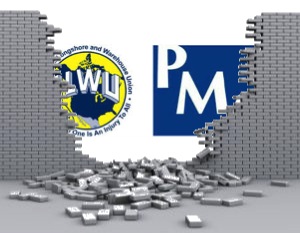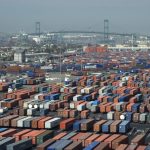Strong Ruling Against ILWU in Seattle T-5 Jurisdictional Dispute Could Be Motivation Behind Labor Action that Closed Ports of LA-LB
Coincidence?
Patrick E. McLean wrote in his book How to Succeed in Evil, “There is no such thing as coincidence, Topper. It is always, always your enemies conspiring against you.” Shippers may feel that’s an apt quote when they connect the dots of last week’s events.
The US National Labor Relations Board (NLRB) ruled against the International Longshore & Warehouse Union (ILWU) in its jurisdictional dispute with the International Association of Machinists & Aerospace Workers (IAM) at Terminal 5 (T-5) of the Port of Seattle. ILWU’s labor action that closed the port last week happened immediately afterward.

The timing couldn’t be more suspicious.
On April 6th, NLRB’s decision against the ILWU dropped quietly in terms of news coverage. However, it was that very same day that the ILWU Local 13 began its labor action to shut down the Ports of Los Angeles and Long Beach during the Thursday night shift and Friday morning shift, which the union followed up with slow labor dispatching on Monday. The labor action and shutdown seemed to take everyone by surprise.
Sudden labor action taking place later in the same day that this decision went against the ILWU, if not related, would be incredibly coincidental.
The ILWU should certainly not be considered an enemy of shippers, but shippers have often paid heavily for disruptive labor action from the union during negotiation periods when the union’s master contract has expired in the past. Ultimately, the events of last week and early this week increase shippers’ anxiety that they will suffer more costly cargo delays from labor action as contract negotiations between the ILWU and the Pacific Maritime Association (PMA), representing employers at the docks, continue to drag out.
ILWU Made T-5 Decision Central Issue in Negotiations
One might think a jurisdictional dispute at one terminal in one port wouldn’t be that big of a deal in contract negotiations that cover dockworkers coast-wide. One would be wrong.
The ILWU put this dispute front and center in labor talks. For a long period, the union even refused to negotiate until the matter was resolved.
In fact, the T-5 jurisdictional dispute held up contract negotiations between the ILWU and the PMA for months. Finally, the ILWU agreed to engage in talks with the PMA before the dispute at the Port of Seattle was resolved. However, by all reports, the at-last-resumed talks haven’t resulted in much up to this point.
However, it should be noted that the parties have agreed not to talk to the media about what’s happening in the negotiations. That leaves much of what the media has to say about negotiation progress to speculation. It is possible there has been more progress in negotiations than those on the outside realize. One can only hope.
What we do know is the ILWU aggressively goes after jobs at the ports to which other unions have claims. The ILWU claims that in concession for being granted the right to update individual terminals with automation in the 2008 master contract with the ILWU, the PMA promised to back the union in any jurisdictional disputes it has with other unions. The ILWU claimed the PMA failed to follow through with that when it came to the T-5 dispute at the Port of Seattle.
By implication, if not directly, the union has called into question all terminal automation updates that have been done since that contract agreement. Leading up to this negotiation cycle, automation was the issue most worried would turn talks contentious. The ILWU linked the T-5 dispute right to the automation issue.
Ruling Says ILWU Engaged in Unfair Labor Practices
If you want to read the ruling against the ILWU, click here for the NLRB’s published PDF of its decision.

Not only did the NLRB rule against the ILWU in the T-5 matter, but its board members also had “strong words” for the ILWU. Bill Mongelluzzo reported in the Journal of Commerce (JOC):
Sources told the Journal of Commerce Friday they were surprised by the strong words that NLRB Chairman Lauren McFerran and two of the board’s members used in the ruling. The NLRB instructed the ILWU to “cease and desist from threatening, coercing or restraining” SSA Marine from assigning maintenance and repair work to members of the IAM. The order also instructed the ILWU to cease “pursuing lost work opportunity claims” at T-5.
…
Thursday’s NLRB ruling said that the ILWU, by continuing to pursue its “lost work opportunity claims” under the 2008 ILWU-PMA coastwide contract, “has engaged in unfair labor practices in violation of … the National Labor Relations Act.”
The NLRB in Thursday’s ruling ordered the ILWU to notify the PMA-ILWU Joint Coast Labor Committee established by the 2008 coastwide contract that it will no longer pursue its lost work opportunity claims, and to post notices “in conspicuous places, including all places where notices to employees are customarily posted” indicating that it will no longer pursue those claims with the ILWU-PMA coast arbitrator.
Something that really stood out to me as I read the NLRB decision was when Chairman McFerran and members Kaplan and Prouty wrote in the short Amended Conclusion of Law section, “By pursuing lost work opportunity claims… in order to force the Employer to assign the maintenance and repair work at Terminal 5 in the Port of Seattle to ILWU-represented employees, rather than employees represented by IAM, ILWU has engaged in unfair labor practices…”
Then, immediately following that came the Order section in which the NLRB ordered the ILWU to:
Cease and desist from
(a) Threatening, coercing, or restraining SSA Terminals, LLC, or any other person engaged in commerce or in an industry affecting commerce, where an object of their actions is to force or require SSA Terminals, LLC to assign maintenance and repair work at Terminal 5 in the Port of Seattle to employees who are members of, or represented by the [ILWU] and [ILWU], Local 19, rather than to employees who are members of, or represented by, [IAM], District Lodge 160, Local Lodge 289.
The ILWU is also ordered to cease and desist from:
Pursuing lost work opportunity claims and seeking to enforce the arbitration award of the Coast Arbitrator in order to obtain maintenance and repair work performed at Terminal 5 in the Port of Seattle by employees represented by the [IAM], District Lodge 160, Local Lodge 289.
In other words, stop engaging in unfair labor practices and tactics and stop trying to use this bad lost opportunity claim to take jobs away from the IAM.
Obviously, the ILWU is unhappy with the ruling. It announced it will appeal. The appeals process could potentially drag on for years.
Meanwhile, shippers just want to have their goods move smoothly through the ports. Unfortunately, while the ILWU fights over jurisdiction, especially during a time of negotiations when the union’s master contract is expired, shippers can’t be confident labor action won’t disrupt West Coast ports at any moment.





